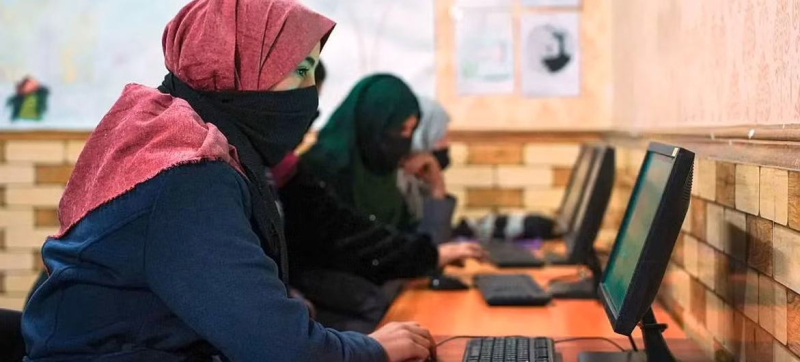- Irregular entry, false asylum claims harm Bangladesh’s global standing |
- Dhaka breathes ‘very unhealthy’ air Tuesday morning |
- Election Code of conduct gazetted, banning posters-drones, AI misuse |
- Rivers Keep Swallowing Land as Bangladesh Battles Erosion |
- UN Warns Refugees Caught in Climate–Conflict Cycle |
When Afghan Women and Girls Are Forced Offline

Women entrepreneurs in Parwan province, eastern Afghanistan, participate in a business development training session.
Nearly 70,000 women in Afghanistan tune in to Radio Femme—an all-female-run online and traditional radio station that provides education and raises awareness of women’s rights across the provinces.
At a time when women are already banned from attending schools and universities, Radio Femme has played a crucial role in offering alternative methods of learning.
The station provides a rare platform for women and girls to continue their studies, with eight teachers delivering lessons in subjects ranging from mathematics to science.
However, on 30 September, without any immediate explanation, the ruling Taliban authorities cut off internet and phone networks across Afghanistan, effectively taking Radio Femme off the air.
The temporary closure of the station is just one example of how women have been affected by the nationwide internet blackout.
This disruption—combined with the aftermath of an earthquake in the east, an ongoing drought in the north, and the return of millions of refugees expelled from neighbouring countries—has made life even more difficult for Afghan women and girls.
“It is another crisis on top of an existing crisis. It is utterly unnecessary for this kind of interruption to take place, and the impact will fall on the lives of Afghan people,” said Arafat Jamal, Country Representative for the UN Refugee Agency (UNHCR).
Why the Internet Is So Vital to Women
In an interview with UN Women, Afghan women like Sama shared how the internet provides a rare opportunity to work, build small businesses, and sell products.
“Through my online shop, I became well known,” Sama said. “I’m earning money, solving my financial problems, and becoming self-sufficient.”
When the blackout struck, Sama—like many other women—lost her only source of income overnight. In Afghanistan, the impact of internet and phone blackouts falls disproportionately on women and girls, UN Women reported.
“It eliminates what is, for many, a final means of learning, earning, and connecting.”
Although internet access has largely been restored across Afghanistan, the message remains clear: this vital gateway to learning, expression, and essential services for women and girls can be shut down at any moment—a stark reminder that the digital space is not neutral, according to UN Women.
Women’s education, mental health, and livelihoods all remain at stake, the agency added.

